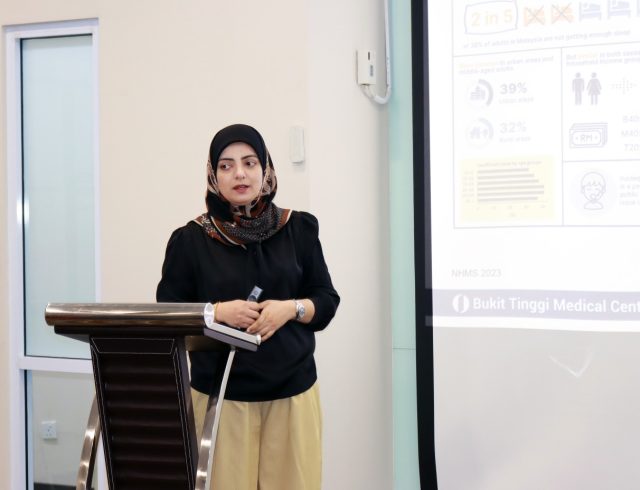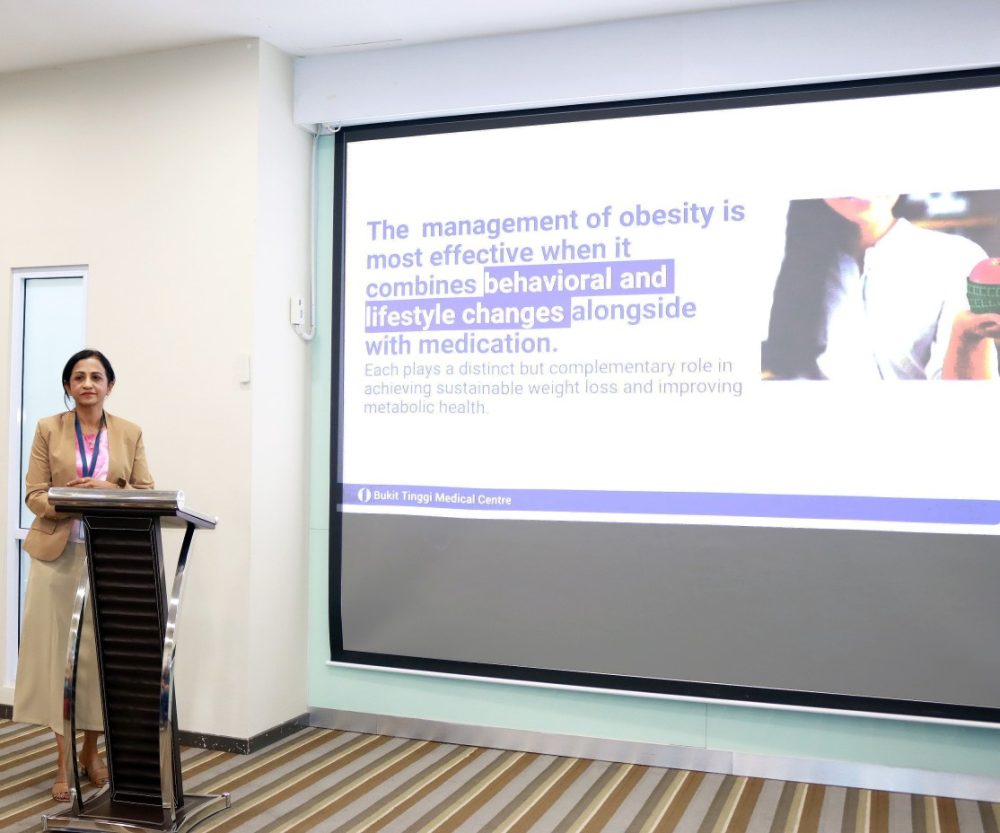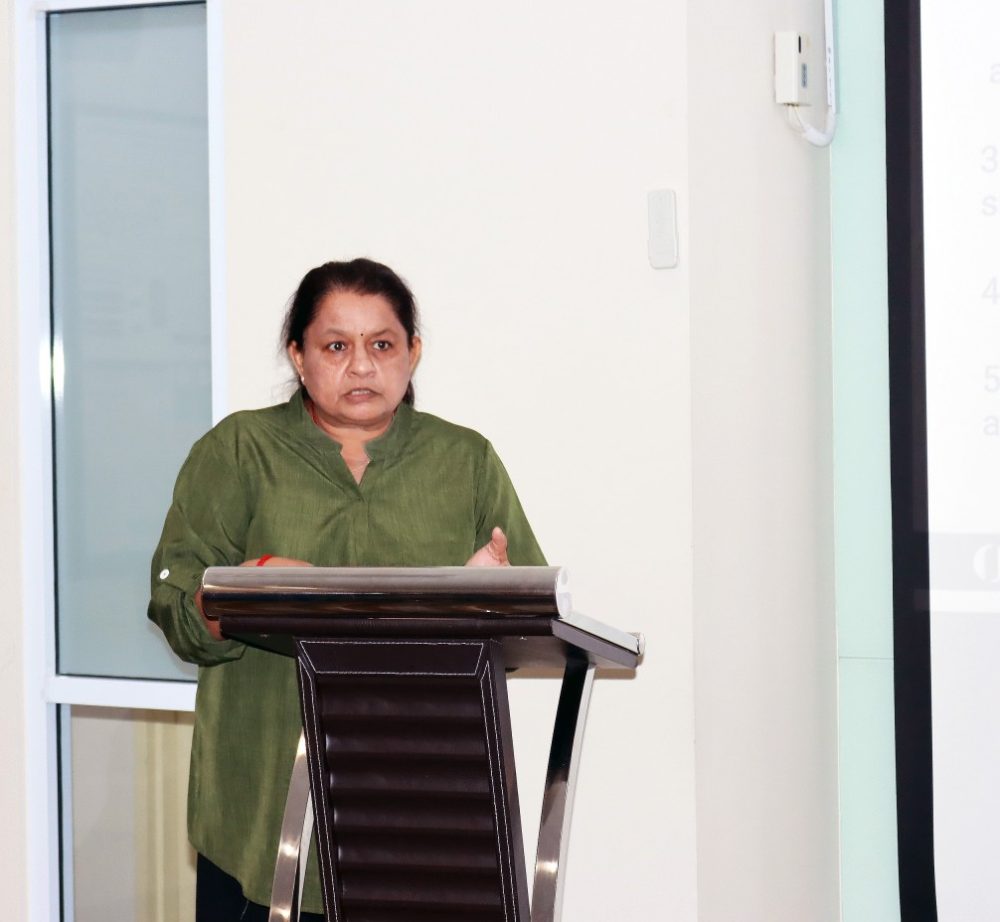
Klang, 13 August 2025 – As Malaysia faces rising obesity rates and related non-communicable diseases, Bukit Tinggi Medical Centre (BTMC) is championing a multidisciplinary, medically supervised approach to weight management, to promote a safer, more structured approach to obesity care, one based on clinical screening, patient education, and long-term support.
In a media session titled, “Beyond Diets and Fads: Medical Experts Decode Sustainable, Supervised Weight Loss for Obesity Management,” BTMC brought together its team of internal medicine physicians, a senior dietitian, a physiotherapist, and a patient advocate to highlight how coordinated, medically guided obesity care can lead to more sustainable health outcomes, especially for individuals with chronic conditions or mobility challenges.
Obesity in Malaysia: A Public Health Emergency
According to the National Health and Morbidity Survey (NHMS) 2024, more than half of Malaysian adults (52.1%) experience abdominal obesity, a major risk factor for non-communicable diseases like heart disease, stroke, and diabetes. Among adolescents, only 5.2% meet daily vegetable intake recommendations, while poor dietary habits and sedentary lifestyles remain widespread.
“Obesity is more than excess weight, it is a chronic medical condition that often hides other risks,” said Dr Nurul Nadiah, Consultant Internal Medicine Physician. “When patients attempt drastic changes without understanding their health baseline, they can do more harm than good. That is why supervised weight management, which considers each patient’s medical profile, nutritional needs, and physical condition, is essential for safe and sustainable results.”
What Medical Supervision Looks Like
Medical oversight ensures that underlying health issues, such as hypertension, sleep apnoea, fatty liver disease, or hormonal imbalances are identified and accounted for before patients embark on a weight loss programme.
For example, patients with prediabetes may require a different dietary strategy than those with thyroid conditions. “We begin with comprehensive blood tests and physical assessments to identify silent risk factors,” explained Dr Nurul Nadiah. “These insights guide every step of the patient’s personalised treatment plan, ensuring safer and more effective outcomes.”

“Every patient’s journey is different. We reassess regularly,” said Dr Tamilvani, Consultant Internal Medicine.
“When medications are involved, they must be closely monitored to ensure effectiveness and to avoid side effects like fatigue, dehydration, or nutrient imbalances.” She added that medical supervision plays a key role in reducing dropout rates, as ongoing follow-ups help patients sustain their efforts and address setbacks early.
Food You Love, Done Differently

Rather than placing patients on strict or unfamiliar diets, the approach involves working with what patients already know and love. “Food is cultural and emotional,” said Senior Dietitian Ms Rama Parahakaran. “We are not here to take that away, we help patients understand how to enjoy food more mindfully.”
For instance, modifying a meal like nasi lemak might involve adjusting portion size, swapping coconut rice for a smaller portion of brown rice, or replacing fried anchovies with grilled chicken. Rather than avoiding favourite dishes, the goal is to train patients to make healthier choices consistently, even during festive seasons, family events, or eating out.
The educational component includes teaching patients how to read food labels, plan balanced meals, manage cravings, and eat at regular intervals to prevent binge-eating behaviours.
Restoring Movement with Purpose
Physical activity is a key part of weight management, but only when done safely. Many patients with obesity also experience knee pain, poor posture, or balance issues. Physiotherapists carry out personalised strength and mobility assessments using AI-assisted tools, allowing for precise, measurable progress.
“Our goal is not just to increase activity, it is to rebuild function in a way that respects the patient’s current limitations,” said Ms Kiran Kaur, Physiotherapist and General Manager of DAVID Rehabilitation Centre. “We guide patients through movements like spinal stabilisation or hip and shoulder exercises that ease joint strain while improving control and endurance.”
These plans are adapted from session to session, allowing for gradual progression. “When someone who used to avoid stairs or long walks can now manage daily tasks without pain, that is a meaningful step forward, not just physically, but emotionally too,” she added.
Personal Journeys, Professional Guidance
One patient, 37-year-old Karthikeyen, shared how clinical structure changed his outlook. “Before my wedding, I tried losing weight on my own, but I kept slipping back,” he said. “Once I got proper guidance, from the doctors, the dietitian, and physiotherapy, it all made sense. I’m still on the journey, but this time I’m doing it right.”
The session also included a demonstration of how physiotherapy tools with AI capabilities can help clinicians monitor progress and make real-time decisions to ensure physical activity remains safe and effective.
While there is no one-size-fits-all solution to obesity, an integrated approach built on clinical care, cultural sensitivity, and ongoing assessment, can offer individuals a more realistic and sustainable path toward better health.
“Obesity care is not about willpower alone. “It is about structure, science, and steady support,” concluded Dr Nurul Nadiah.
For those ready to take the next step, BTMC offers a 3-month comprehensive weight loss programme, including medical consultations, dietitian guidance, and 12-session physiotherapy support. For more information, visit www.bukittinggimedicalcentre.com











